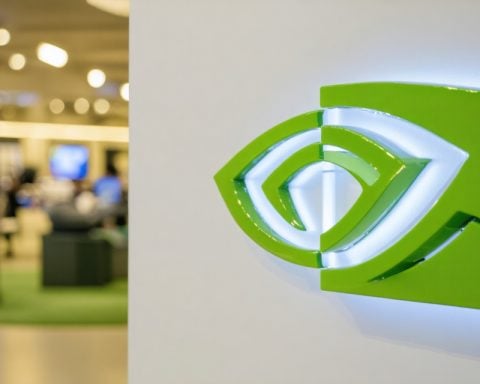- DeepSeek, a Chinese start-up, emerged with breakthrough AI technology, raising concerns about market impacts on Nvidia.
- Nvidia’s stock saw a 12% decline amidst fears of reduced demand for its GPUs if others adopt DeepSeek’s efficient techniques.
- Nvidia remains optimistic about future revenue, projecting $128.6 billion for fiscal 2025, with continued strong GPU sales.
- Wall Street anticipates record-breaking results for fiscal 2026, fueled by Nvidia’s advancements, particularly the GB200 GPU.
- Alphabet’s CEO underscored the evolving AI landscape, emphasizing increasing demand for GPUs, benefiting Nvidia.
- With Alphabet investing $75 billion in data centers, Nvidia’s technology demand is expected to remain robust.
- Despite recent stock fluctuations, Nvidia’s future might involve growth opportunities, offering strategic entry points for investors.
Clouds of doubt gathered over Nvidia after whispers of Chinese start-up DeepSeek’s breakthrough technology stirred investor anxiety. This young disruptor claimed it mastered the sophisticated dance of artificial intelligence, mimicking the prowess of industry behemoths with a fraction of the hardware muscle. DeepSeek revealed the surprising simplicity of training their competitive AI models using innovative algorithms and clever data distillation.
Nvidia’s stocks staggered, taking a 12% tumble from their peak. Investors fretted that if others in the AI world adopted these efficient techniques, demand for Nvidia’s once-coveted GPUs might dwindle. The specter of fading revenue haunted the corridors of Silicon Valley.
However, the reality might not be that grim. Inside Nvidia’s bustling headquarters, optimism remained. With fiscal 2025 on the horizon, projections painted a canvas of soaring revenue—a potential $128.6 billion, driven largely by fervent GPU sales. Wall Street expectations for fiscal 2026 shimmer with the possibility of breaking records, riding the wave of Nvidia’s cutting-edge GB200 GPU, which has taken the lead in AI advancement.
Tech titan Alphabet injected fresh confidence into shaken markets. CEO Sundar Pichai reassured analysts that the AI landscape is evolving, not retracting. As AI reasoning models like DeepSeek’s and Alphabet’s own creations evolve, they demand more computing might for data interpretation—a timely boon for Nvidia.
With Alphabet ramping up its data center investments to a startling $75 billion, the demand for Nvidia’s technological marvels seems unwavering. Perhaps Nvidia’s narrative isn’t one of decline but rather of rediscovery, turning potential setbacks into unique opportunities for growth. The recent market dip, perceived by wary investors, might just be the perfect entry point for opportunistic buyers.
Is Nvidia Really At Risk From AI Startups? Discover Why The Headlines Might Be Deceptive
Understanding the Threat: DeepSeek’s Breakthrough
Advanced startups like DeepSeek are drawing attention by developing AI technologies that can perform complex computations without relying heavily on expensive hardware, like Nvidia’s GPUs. This innovation centers around smarter algorithms and data distillation techniques, emphasizing efficiency over sheer processing power.
How-To Steps & Life Hacks
Implementing Efficient AI Using Limited Hardware:
1. Focus on Algorithm Optimization: Concentrate on creating or using algorithms that require less computational power. For example, understanding and applying techniques such as parameter pruning or neural architecture search can result in more resource-efficient AI models.
2. Data Distillation Techniques: Work on reducing the data complexity without losing the underlying information needed for model training. Techniques like knowledge distillation compress the knowledge of large models into smaller versions, maintaining reasonable performance.
3. Collaborative Filtering: Use techniques like collaborative filtering for more personalized AI outputs with limited resources.
4. Cloud Collaboration: Use cloud services for flexible resource allocation when needed instead of maintaining expensive local infrastructure.
Real-World Use Cases
1. Small to Mid-Sized Enterprises (SMEs): SMEs can adopt these strategies to develop competitive AI solutions without heavy hardware investment.
2. Educational Institutions: Effective in settings where budget constraints limit access to high-end computing resources.
3. Edge Computing Devices: Devices requiring AI capabilities but constrained by size and energy can benefit from these algorithms.
Market Forecasts & Industry Trends
Despite brief disruptions, Nvidia is positioned to capitalize on AI’s escalating demands. Analysts predict a robust fiscal performance, with expectations of revenues hitting $128.6 billion in fiscal 2025. The driving factors include Google’s $75 billion investment ramp-up in AI infrastructure, alleviating immediate investor concerns.
Reviews & Comparisons
Nvidia GPUs vs. DeepSeek’s Approach:
– Performance: Nvidia’s GB200 GPUs are unmatched in high-volume data processing capacity.
– Cost Efficiency: DeepSeek’s methods allow for more cost-effective AI model development.
Controversies & Limitations
While DeepSeek’s innovation seems promising, there remain some limitations:
– Scalability Issues: As AI models grow, so might the hardware requirements, which could still favor GPU reliance.
– Limited Scope: DeepSeek’s methods may not yet cover all use cases where Nvidia’s GPUs excel.
Features, Specs & Pricing
Nvidia’s latest GB200 GPUs boast top-tier specs that support complex AI tasks like natural language processing and computer vision. Pricing varies based on configuration, generally remaining at a premium reflective of their capability.
Security & Sustainability
Nvidia continues investing in sustainable technologies and energy-efficient models, ensuring minimal carbon footprint and bolstering their market resilience against eco-friendly competition.
Insights & Predictions
While the entry of startups may initially pressure companies like Nvidia, the demand for advanced computing is projected to surge, with markets favoring AI hardware leaders. Future trends suggest the continued evolution of hybrid models marrying software efficiencies with powerful hardware.
Tutorials & Compatibility
For developers, Nvidia’s CUDA parallel computing platform offers a strong foundation to engage with high-performance tasks. Tutorials on platforms like PyTorch or TensorFlow demonstrate effective use of GPUs in AI development.
Pros & Cons Overview
Pros:
– Robust processing capability.
– Strong ecosystem support.
– Constant innovation in GPU technologies.
Cons:
– Higher initial investment.
– Dependency on the ongoing high-demand AI market.
Conclusion & Recommendations
While concerns about new developments exist, informed investors could view Nvidia’s setback as an entry opportunity. Companies opting for nimble, efficient AI solutions might explore hybrid models leveraging both software and hardware innovations.
Quick Tips for Investors and Developers:
– Monitor AI trends to anticipate hardware demand shifts.
– Small businesses should explore maximizing AI efficiency with available resources.
– Keep updated with Nvidia advancements and industry responses to new technologies.
For more details on breakthrough technologies and industry insights, visit link name.


















